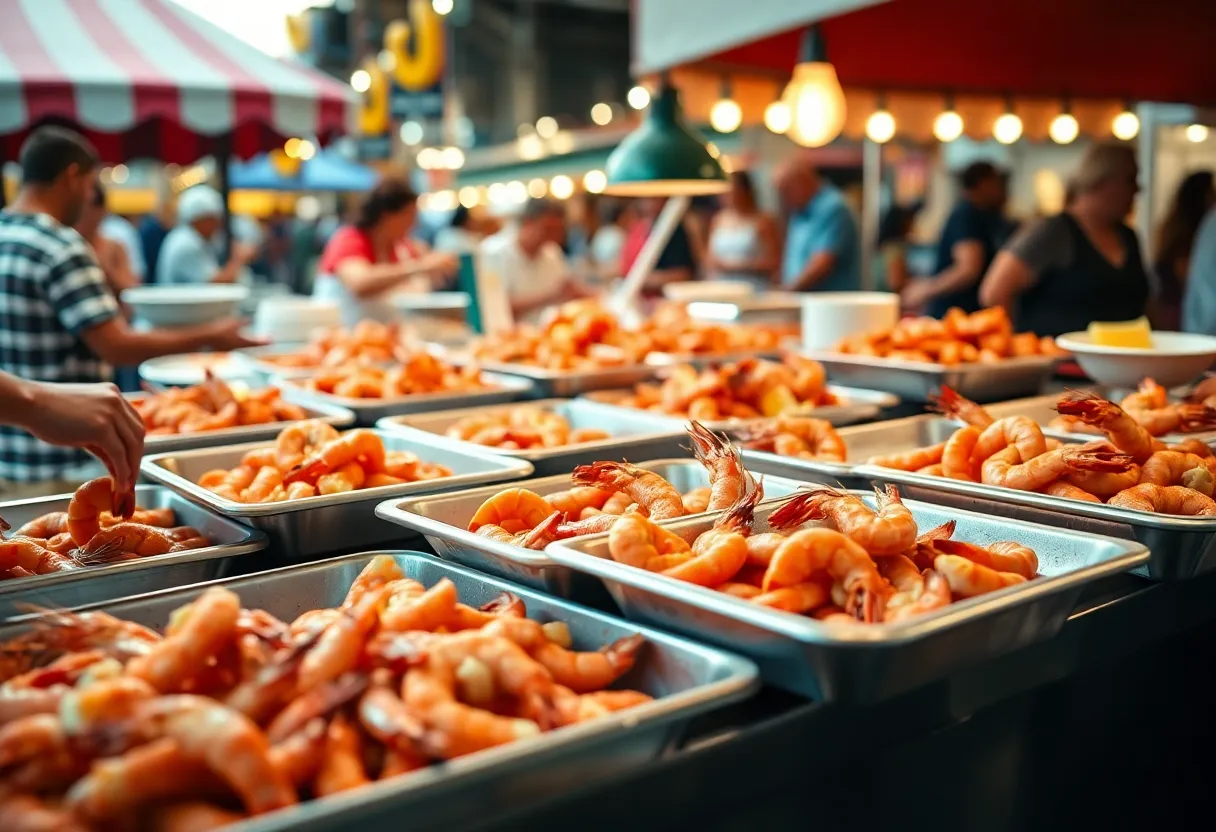News Summary
The New Orleans Jazz & Heritage Festival has set a high standard for seafood integrity by ensuring that nearly all shrimp dishes served at the event are authentic, U.S. wild-caught Gulf shrimp. A recent genetic testing study revealed that 18 of 19 shrimp dishes from various vendors met these authenticity standards, highlighting the festival’s commitment to supporting local shrimpers and addressing concerns about seafood fraud. This positive outcome contrasts sharply with findings from other regions, emphasizing the importance of transparency in the seafood industry.
New Orleans – The New Orleans Jazz & Heritage Festival has distinguished itself by successfully upholding the integrity of seafood served at its event amidst widespread concerns about seafood fraud in the United States. A comprehensive genetic testing study revealed that nearly all shrimp dishes offered over the 2025 festival featured authentic, U.S. wild-caught Gulf shrimp.
The study, conducted by SeaD Consulting with the application of the RIGHTTest genetic analysis tool, evaluated 19 shrimp-based dishes from different vendors participating in the festival. The results confirmed that 18 out of the 19 dishes tested were made with genuine Gulf shrimp. Only one dish was found to contain imported shrimp, which belonged to a vendor whose other offerings also passed the genetic authenticity test.
This research was funded by the Southern Shrimp Alliance, an organization dedicated to advocating for domestic shrimpers in the region. The findings underscore a commitment from Jazz Fest vendors to support the local shrimp industry, demonstrating community pride and a dedication to quality seafood.
Notably, there is no legal obligation for temporary food vendors in Louisiana to disclose whether their shrimp is imported or farm-raised. Consequently, this positive outcome is particularly impactful given the alarming trends of seafood fraud seen elsewhere in the country. The situation in New Orleans stands in stark contrast to findings from Wilmington, North Carolina, where a similar study revealed that 77% of restaurants surveyed were serving imported shrimp. In that case, only 10 out of 44 establishments passed the authenticity tests.
Seafood mislabeling is a significant issue, occurring in an alarming 78% of cases in states that lack seafood origin labeling laws. Even states with regulations face high rates of mislabeling, with 36% reported in those jurisdictions. The success of the Jazz Fest could provide a model for how cultural institutions can influence sourcing practices and promote local support within the food industry.
The positive results from the genetic testing have been heralded as a major win for Louisiana’s shrimp industry, especially as the state approaches its inshore shrimping season. The Southern Shrimp Alliance plans to leverage the promising outcomes at the festival to address ongoing mislabeling practices and advocate for greater transparency across the seafood industry.
As consumers become more aware of the issues surrounding seafood sourcing, they are encouraged to inquire about the origins of the products they consume and to support businesses that prioritize transparency. John Williams, speaking for the Southern Shrimp Alliance, emphasized that the high levels of accountability showcased at Jazz Fest could serve as an inspiration for future events and dining establishments looking to align with ethical sourcing practices.
In an effort to combat seafood fraud, a new law enacted in Louisiana as of January 1, 2025, mandates that restaurants clearly display the country of origin for shrimp and crawfish, with penalties in place for non-compliance. This legislation reflects growing public concern regarding seafood authenticity and aims to foster greater trust between consumers and suppliers.
The solidarity shown by vendors at the Jazz Fest not only reflects a commitment to serving quality food but also highlights the importance of local industries, particularly in a state known for its rich culinary traditions. As the festival continues to uphold these integrity standards, it sets a precedent that could enhance consumer confidence and support for local seafood producers.
Deeper Dive: News & Info About This Topic
HERE Resources
New Seafood Labeling Law in Louisiana Aims to Protect Consumers
New Orleans Faces DNA Testing Backlog Crisis
Surprising Shrimp Scandal Hits Lafayette Restaurants
Additional Resources
- The Center Square
- Wikipedia: Seafood Fraud
- NOLA
- Google Search: New Orleans Jazz Fest 2025
- Indulgexpress
- Google Scholar: Seafood Authenticity Testing
- New York Times
- Encyclopedia Britannica: Seafood
- Fox 8 Live
- Google News: Seafood Mislabeling

Author: STAFF HERE NEWORLEANS WRITER
The NEW ORLEANS STAFF WRITER represents the experienced team at HERENewOrleans.com, your go-to source for actionable local news and information in New Orleans, Orleans Parish, and beyond. Specializing in "news you can use," we cover essential topics like product reviews for personal and business needs, local business directories, politics, real estate trends, neighborhood insights, and state news affecting the area—with deep expertise drawn from years of dedicated reporting and strong community input, including local press releases and business updates. We deliver top reporting on high-value events such as French Quarter Festival, New Orleans Jazz & Heritage Festival, and Essence Music Festival. Our coverage extends to key organizations like the New Orleans Chamber of Commerce and Greater New Orleans, Inc., plus leading businesses in energy, healthcare, and education that power the local economy such as Entergy, Ochsner Health, and Tulane University. As part of the broader HERE network, including HEREShreveport.com, we provide comprehensive, credible insights into Louisiana's dynamic landscape.

